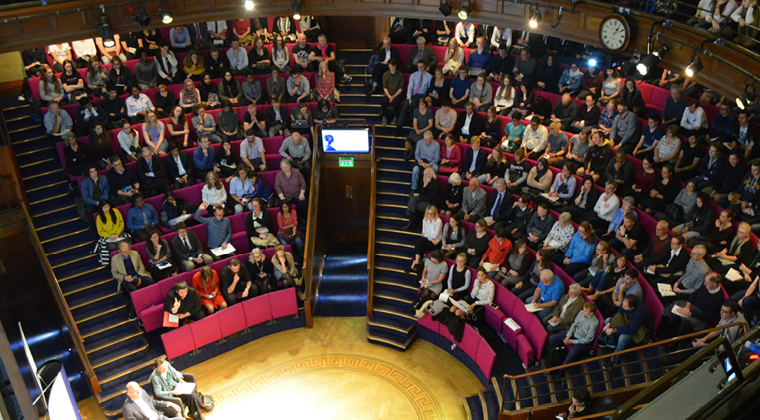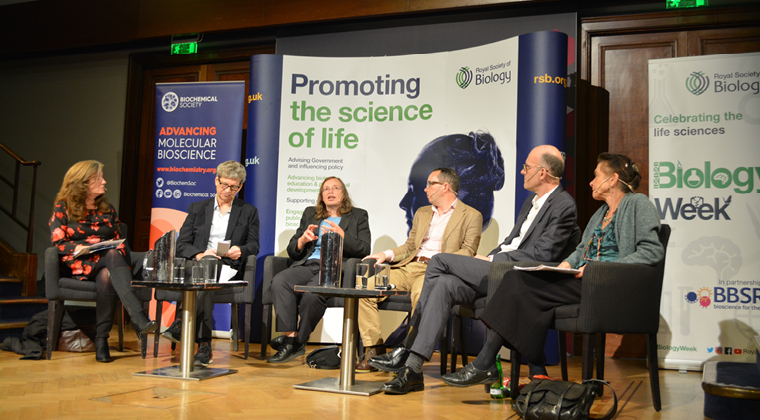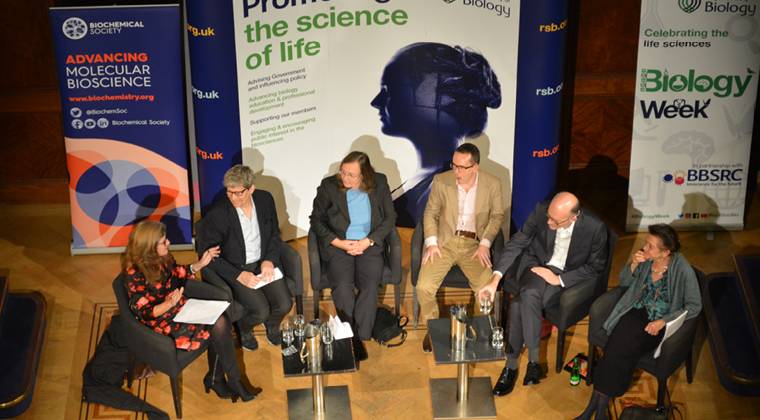News
RSB and Biochemical Society pack out the Royal Institution for the annual Biology Week debate
- Details
- 10 October 2017
Over 400 members of the public attended an expert panel discussion on genome editing at the Royal Institution, as part of Biology Week 2017.
Science, communication and social science experts came together to debate the potential for and implications of editing the genome of humans and other organisms, and their thoughts on the likely future developments of the field.

Over 400 people attended the lecture to discuss the hotly debated topic of genome editing (Photo credit: RSB)
Genome editing has the potential to improve the health of millions of people worldwide in a variety of ways.
However, it also raises questions of ethics and rights over the theoretical potential to alter physical attributes or other human characteristics.
A panel of five experts came together to discuss their work and their thoughts and opinions, with the discussion chaired by Fiona Fox, Chief Executive of the Science Media Centre.
Dr Robin Lovell-Badge FRSB, Head of the Laboratory of Stem Cell Biology and Developmental Genetics at the Francis Crick Institute, began the session by giving an overview of the science of genome editing, and argued that, with public input and regulation, genome editing could make a positive contribution to society.
Dr Ann Bruce, Associate Director of Research (Knowledge Exchange and Impact) at the University of Edinburgh, then discussed the potential uses of genome editing in farming and agriculture – an area often overlooked in favour of discussions about health and disease.

FLTR: Fiona Fox (chair), Robin Lovell-Badge, Ann Bruce, John Parrington, Paul Thompson and Shirley Hodgson (Photo credit: RSB)
Dr John Parrington, Associate Professor in Cellular and Molecular Pharmacology at the University of Oxford, raised the point that genome modification is not a new area of research or practice and is in fact an ancient human pursuit.
Peter Thompson, Chief Executive of the Human Fertilisation and Embryology Authority offered a non-scientist’s perspective on the issue from his experience of development and use of regulation. He argued that there is no evidence to suggest that the public supports a move towards the use of genome editing for aesthetic reasons, and stressed the importance of regulatory procedures in the future applications of the technology.
Professor Shirley Hodgson FRSB, Professor of Cancer Genetics at St George’s, University of London, completed the panel presentation by arguing that it was important to take a far horizon view of how undesirable outcomes could arise, for example genome editing could alter perceptions of people with disabilities or increase the divide between rich and poor.

Questions were taken from the audience and discussed by the panel (Photo credit: RSB)
The panel then answered a diverse range of questions from Fiona Fox and the audience. Topics such as how genome editing might someday help humans adapt to living in space, and whether public engagement with the genome editing debate will be effective, were covered.
The debate gave the public the opportunity to learn about genome editing from a panel of experts, and sparked a wealth of interesting discussions.
If you were unable to attend the event, you can watch a recording of the debate, which was livestreamed by the Biochemical Society on the night. Photos from the event are also available to download from the RSB Flickr page.
The Biology Week debate was held in partnership with the Biochemical Society and the Royal Institution for Biology Week 2017.
Find out about other Biology Week events on our calendar.

